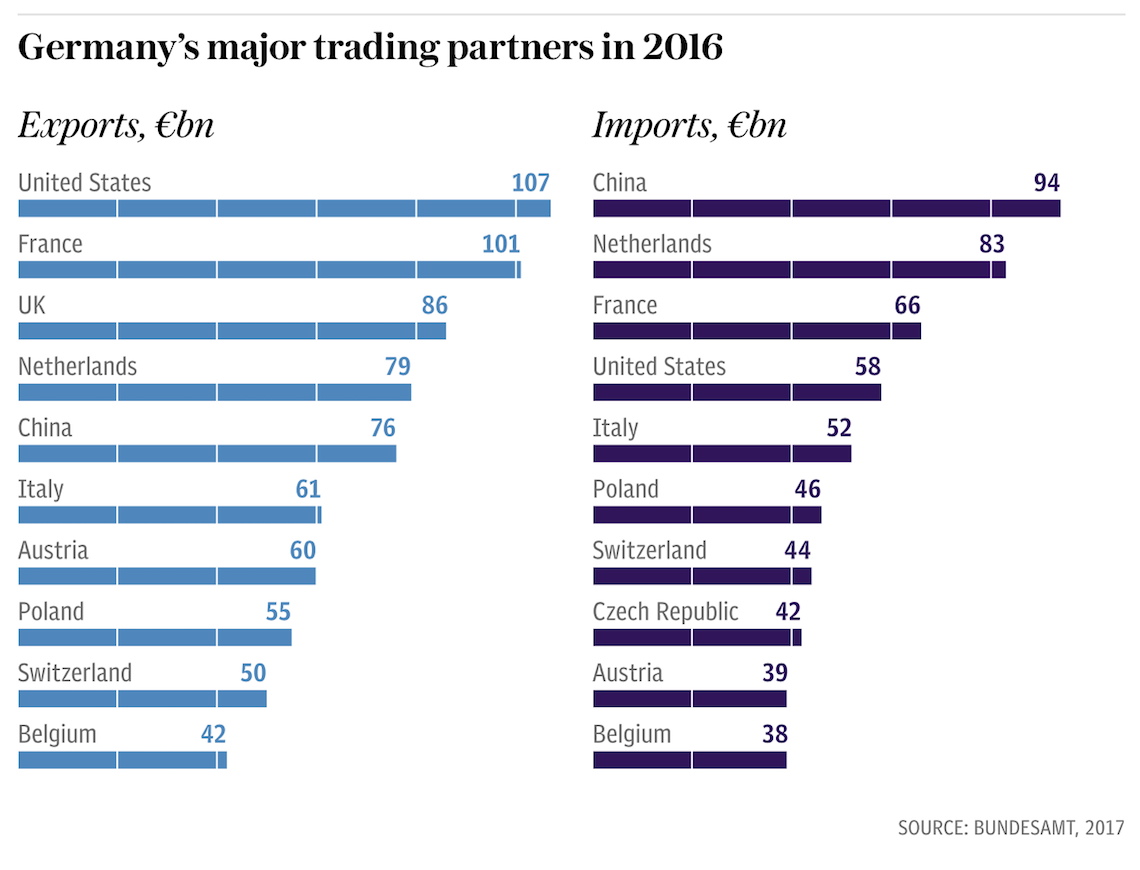Die Politiker sind nicht alleine in ihrer Hybris
Dass unsere Politiker vor Selbstillusionierung und -überschätzung bezüglich der vermeintlichen Stärke der deutschen Wirtschaft die erheblichen Risiken für unseren Wohlstand nicht sehen wollen, mag noch verständlich sein. Doch weniger verständlich ist, wenn sich Vertreter der Wirtschaft genauso äußern. Ich denke hier beispielsweise an Anton Börner vom BGA. Dabei will ich bewusst die britische Reaktion auf sein Interview in DIE WELT als Basis nehmen. Ich bin da klar auf der britischen Seite und fürchte, dass die EU und Deutschland die Situation völlig falsch einschätzen.
- “Germany’s powerful trade chief has dismissed Brexit as pipe-dream that will never happen, insisting that markets remain calm only because investors are entirely discounting the political noise from Westminster. ‚Brexit is just talk so far. I doubt it will ever happen,‘ said Anton Börner.” – bto: Vermutlich glaubt er, wie bei früheren Abstimmungen, die nicht im Sinne der EU ausgingen, dass die Briten nochmals abstimmen (so lange, bis das Ergebnis passt) oder aber das Votum ignorieren. Ich halte das für naiv. Die Briten werden als alte Demokratie die Entscheidung nicht revidieren. Zugleich haben sie viele Trümpfe in der Hand, um das Land positiv zu entwickeln.
- “The comments offer a revealing window into attitudes in Berlin, where much of the political class still thinks that the UK will recoil from the Article 50 process and opt back into the EU (…) perhaps tempting the German authorities to think they take a particularly tough line without serious consequences. This is fertile ground for misjudgments.” – bto: Ich glaube, es liegt auch daran, dass sich die Politiker (und letztlich ist Börner mehr Politiker als Unternehmer hier) nicht vorstellen können, dass es eine Rückentwicklung gibt. Dies macht es aber so gefährlich.
- “German trade data suggests that the cost of an acrimonious Brexit – with EU trade tariffs, reaching 10pc on cars – is higher for German industry than often acknowledged. Last year the German trade surplus with the UK was €50.5bn (£44.7bn), bigger than its surplus with any other country, and four times its entire surplus with the rest of the eurozone (€12.9bn). This is not trivial.” – bto: Jetzt könnten wir natürlich sagen, dass eine Reduktion unseres Überschusses gewünscht ist. Fragt sich nur, ob dies auf diesem Weg erfolgen sollte?
- “‚There is still an assumption that the UK will blink and ask for Brexit to be called off,‘ said David Marsh, (…) British leaders are equally misled in thinking that Germany will come to the rescue and force through a friendly deal to shield its car industry. ‚Both sides are misjudging the other‘ (…).” – bto: Und ich bleibe dabei, dass letztlich wir auf verschiedenem Wege unter den Folgen mehr leiden werden als Großbritannien.
- “To the surprise of many in Britain, Germany has so far proved to be one of the most unyielding countries in the EU (…) Berlin was strikingly hostile to an British-Italian initiative and to a Bruegel paper by France’s Jean Pisani-Ferry calling for a ‘Continental Partnership’ to preserve close trading ties (…) Germany has played a lead role in stipulating that there can be no discussion of the future relationship with Britain until the issue of Brexit reparations payments is settled (…).” – bto: wobei man sich fragt, wieso eigentlich? Geht es nur um die abschreckende Wirkung? Dieser Schuss könnte nach hinten losgehen.
- “The EU system both heightens and masks German power. The single market has served Germany extremely well but often at the expense of other EU states. Italy has seen no benefit from the arrangement for a quarter century. It correlates with national decline.” – bto: Bekanntlich sehe ich den Nutzen für uns nicht. Allerdings denke ich zunehmend, dass es in der Tat eine Allianz von Exportwirtschaft mit Politik ist, die allerdings nicht den dauerhaften Wohlstand steigert wegen des Aufbaus von Forderungen in einer überschuldeten Welt.
- “The risk for Germany as it seeks to make a punitive example out of Britain is not only that it could trigger an anti-German ‘buyers’ strike’ by offended British consumers but also that its own relations with other EU states will be even harder to manage.” – bto: Ich denke, der Brexit wird die EU auf Dauer mehr spalten als einigen und eine Bestrafung wird auf die EU zurückfallen.
→ The Telegraph: „German trade boss dismisses Brexit as empty talk“, 18. September 2017








